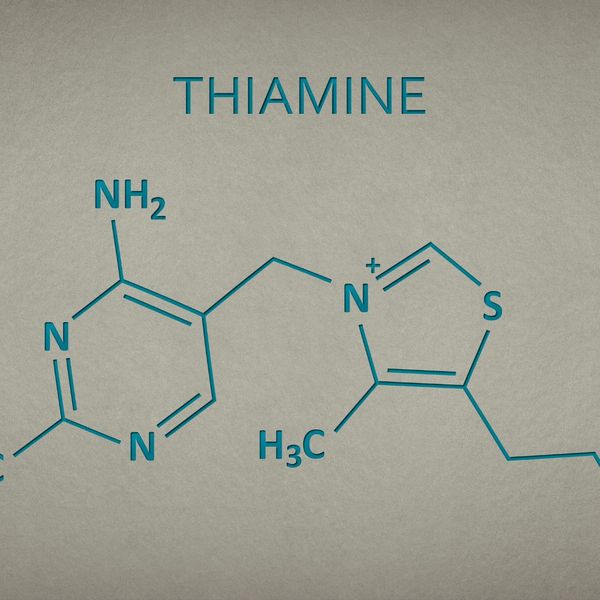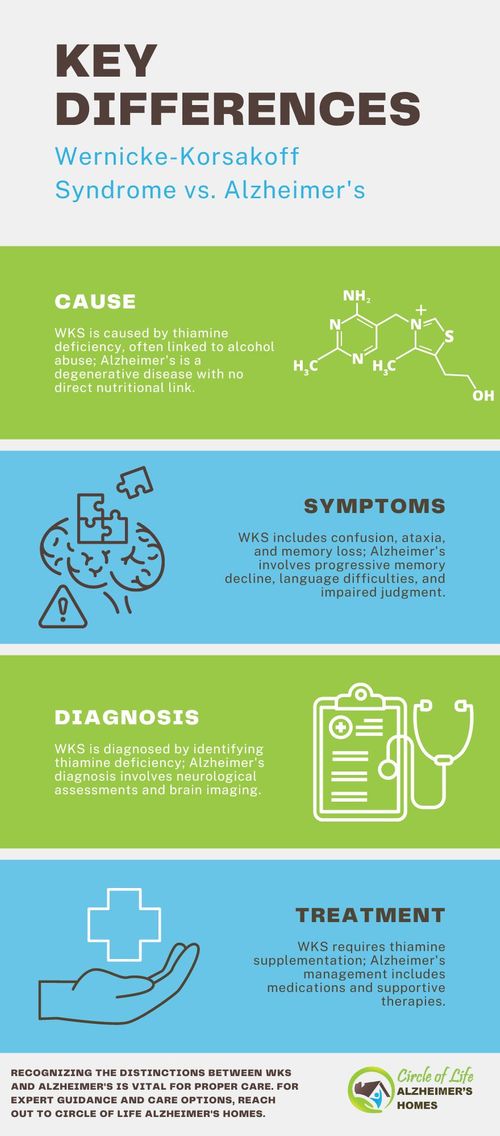Wernicke-Korsakoff Syndrome (WKS) and Alzheimer's disease are two distinct neurological disorders that affect memory and cognitive functions. While both conditions can lead to significant cognitive impairments, they have different causes, symptoms, and treatment approaches. Circle of Life Care blog will explore the key differences between Wernicke-Korsakoff Syndrome and Alzheimer's, helping you understand each condition's unique characteristics.
Wernicke-Korsakoff Syndrome vs. Alzheimer's: Key Differences
Wernicke-Korsakoff Syndrome vs. Alzheimer's: Key Differences

Understanding Wernicke-Korsakoff Syndrome
Wernicke-Korsakoff Syndrome is a neurological disorder caused by a severe deficiency of thiamine (vitamin B1). It typically occurs in two stages: Wernicke's encephalopathy and Korsakoff's psychosis. Wernicke's encephalopathy is an acute phase characterized by confusion, lack of muscle coordination, and eye movement abnormalities. If left untreated, it can progress to Korsakoff's psychosis, a chronic condition marked by severe memory loss, confabulation, and difficulty forming new memories.

Understanding Alzheimer's Disease
Alzheimer's disease is a progressive neurodegenerative disorder that primarily affects older adults. It is characterized by the accumulation of amyloid plaques and tau tangles in the brain, leading to the death of brain cells. The symptoms of Alzheimer's disease typically begin with mild memory loss and gradually worsen over time, leading to severe cognitive decline, impaired reasoning, and changes in behavior. Unlike WKS, Alzheimer's disease is not directly linked to nutritional deficiencies.

Key Differences in Symptoms
The symptoms of Wernicke-Korsakoff Syndrome and Alzheimer's disease can overlap, but there are distinct differences. WKS symptoms often include confusion, ataxia (lack of muscle coordination), and visual disturbances, primarily due to thiamine deficiency. In contrast, Alzheimer's disease presents with progressive memory loss, difficulty with language, and impaired judgment. While both conditions can cause memory issues, the nature and progression of these symptoms differ significantly.

Diagnosis and Treatment Approaches
The diagnosis of Wernicke-Korsakoff Syndrome involves identifying thiamine deficiency and related symptoms. Treatment focuses on thiamine supplementation and addressing the underlying cause, such as alcohol abuse. Early intervention can prevent the progression of Korsakoff's psychosis. On the other hand, Alzheimer's disease diagnosis involves neurological assessments, brain imaging, and cognitive testing. While there is no cure for Alzheimer's, treatments may include medications to manage symptoms and support therapies to improve quality of life.

Understanding the differences between Wernicke-Korsakoff Syndrome and Alzheimer's disease is crucial for accurate diagnosis and appropriate care. While both conditions impact memory and cognitive function, they arise from different causes and require distinct treatment approaches. If you suspect a loved one may be experiencing symptoms of either condition, seek medical advice for proper evaluation and management. Contact us today to learn more about our services and how we can assist your family.
